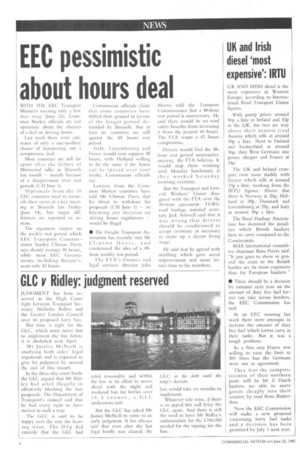EEC pessimistic about hours deal
Page 6

If you've noticed an error in this article please click here to report it so we can fix it.
WITH THE EEC Transport Ministers meeting only a few days away (June 24), Common Market officials are not optimistic about the chances of a deal on driving hours.
Last week there were estimates of only a one-in-three chance of hammering out a compromise deal.
Most countries are still far apart after the failure of Ministerial talks in Brussels last month — mainly because of a disagreement over rest periods (CM June 1).
Diplomats from the 1() EEC countries tried to recon cile their views at a key meeting in Brussels last Friday Uune 14), but major differences are reported to remain.
The argument centres on the weekly rest period which EEC Transport Commissioner Stanley Clinton Davis says should average 48 hours, while most EEC Governments, including Britain's,' want only 42 hours. Commission officials claim that some countries have shifted their ground in favour of the longer period demanded by Brussels. But at least six countries arc still against the 48 hours rest period.
Italy. Luxembourg and France would now support 48 hours, with Holland willing to do the same if the hours can be spread over four weeks, Commission officials say.
Lawyers from the Common Market countries have told Mr Clinton Davis that his threat to withdraw his proposals (C)'4 June 1) — so blocking any decision on driving hours regulations — would be illegal.
• The Freight Transport Association has recently met Mr Clinton Davis, and condemned the idea of a 48hour weekly rest period.
The ETA's finance and legal services director John Morris told the Transport Commissioner that a 48-hour rest period is unnecessary. He said there would be no road safety benefits from increasing it from the present 40 hours. The FTA wants a 42 hours compromise.
Drivers would find the 48hour rest period unattractive anyway, the FTA believes. It would stop them working until Monday lunchtimes if they worked Saturday morning overtime.
But the Transport and Genera] Workers' Union disagreed with the FTA over the 48-hour agreement. TGWU road haulage national secretary Jack Ashwell said that it was wrong that drivers should be conditioned to accept overtime as necessary to make up a decent living wage.
He said that he agreed with anything which gave social improvement and more leisure time to his members.




































































































